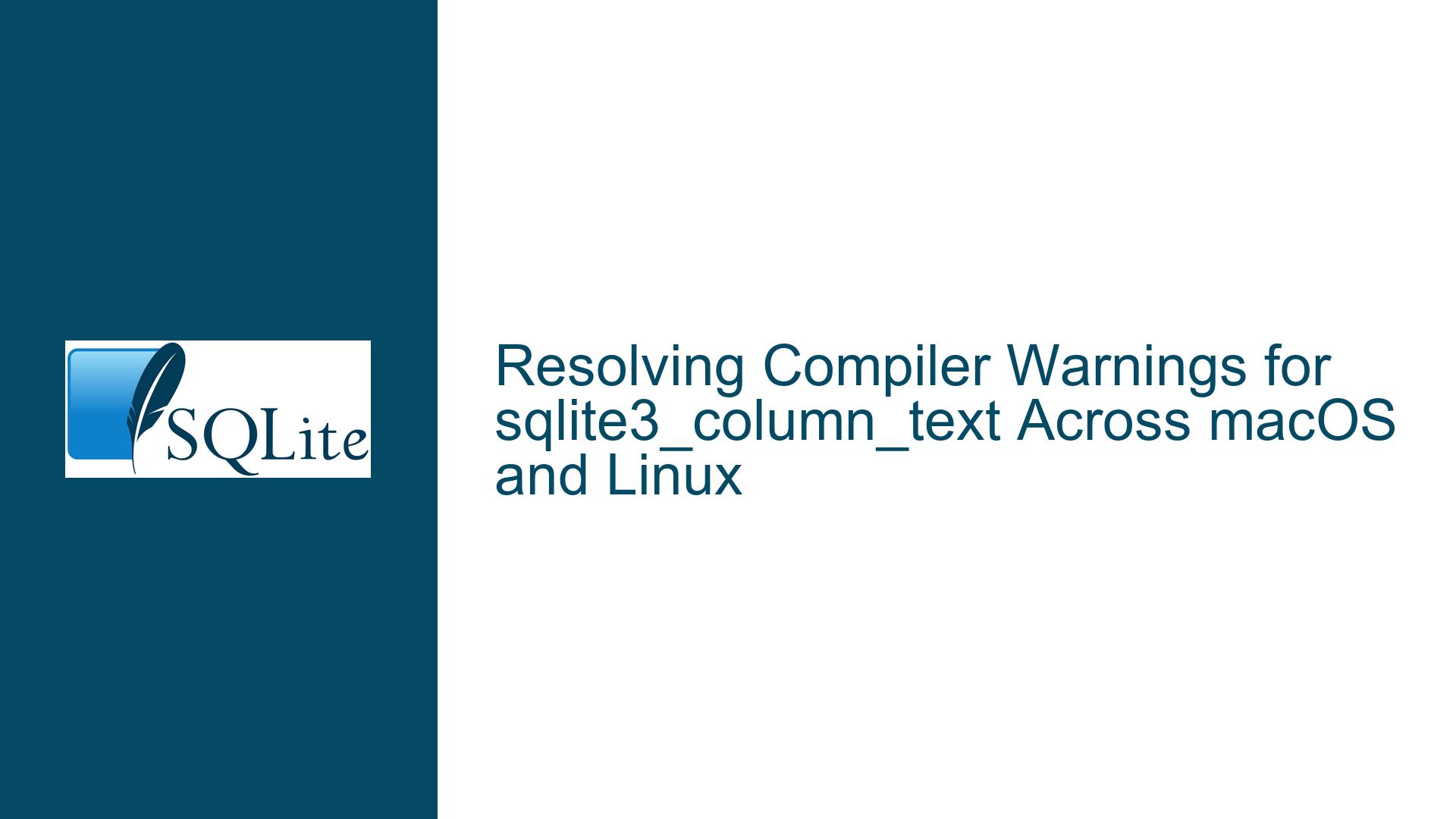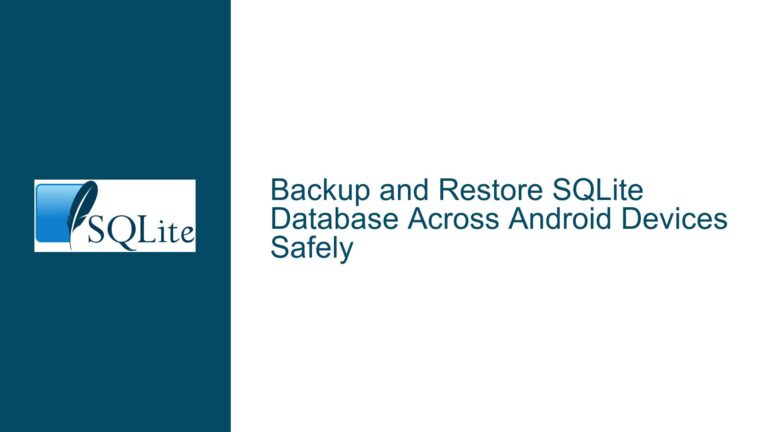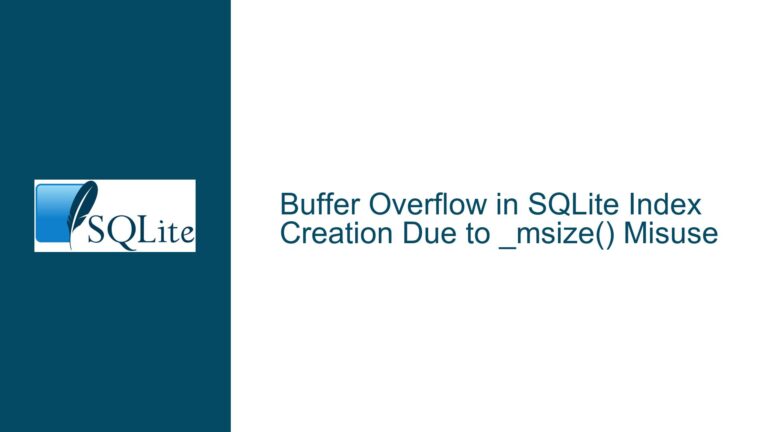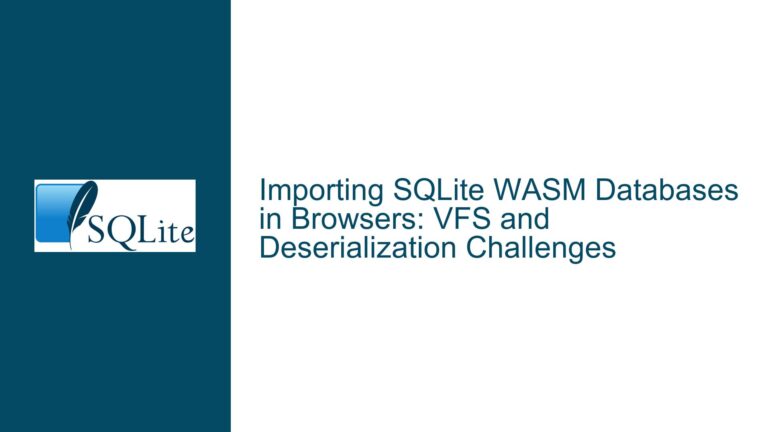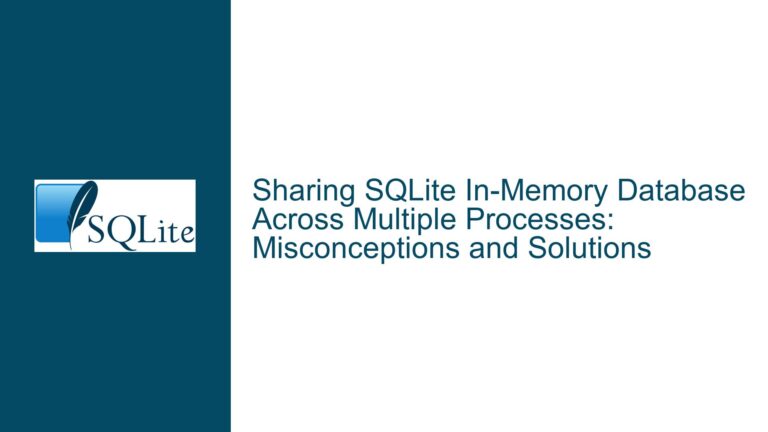Resolving Compiler Warnings for sqlite3_column_text Across macOS and Linux
Compiler Warnings with sqlite3_column_text on macOS vs. Linux
The core issue revolves around a compile-time error that occurs exclusively in macOS environments when using the SQLite C API function sqlite3_column_text(). The error manifests as a pointer type mismatch between const unsigned char* (returned by the SQLite function) and const char* (expected by a test assertion macro). This discrepancy triggers a -Wpointer-sign warning in Clang/GCC compilers on macOS, which is treated as a fatal error due to strict compiler flags (e.g., -Werror). The same code compiles without warnings on Linux systems, raising questions about cross-platform compatibility in C codebases that interface with SQLite.
The error message explicitly points to a line in a unit test (test_database.c:237) where sqlite3_column_text() is passed to assert_string_equal(), a macro from the cmocka testing framework. The crux of the problem lies in the implicit type conversion between unsigned char* and char*, which violates strict type-checking rules enforced by macOS compilers. SQLite’s API defines sqlite3_column_text() as returning const unsigned char* since its inception, but many C codebases assume equivalence between char* and unsigned char* for string handling, leading to silent compatibility issues that surface only under stricter compiler settings.
This discrepancy between macOS and Linux toolchains highlights deeper differences in default compiler configurations, warning severity levels, and platform-specific assumptions about pointer type compatibility. The macOS Clang compiler (and its GNU counterpart) enforces stricter adherence to C type rules compared to common Linux GCC configurations, where such implicit conversions may be permitted as extensions or downgraded to non-fatal warnings.
Root Causes of Pointer Type Mismatch in Cross-Platform SQLite Code
1. SQLite API’s Use of Unsigned Character Pointers
SQLite’s design philosophy prioritizes unambiguous data representation. The sqlite3_column_text() function returns const unsigned char* to explicitly indicate that the returned data is a sequence of bytes that may include non-ASCII or binary content. This choice avoids conflating "text" with narrow character strings (which are signed in many C implementations) and ensures consistent handling of BLOB data. However, many developers treat unsigned char* and char* as interchangeable for string operations, leading to type mismatches when strict compiler checks are enabled.
2. Compiler-Specific Treatment of Pointer Sign Compatibility
The C standard (ISO/IEC 9899) permits implicit conversion between char* and unsigned char* only via explicit casts, as these types are not compatible in assignments or function arguments. Compilers like Clang (default on macOS) and GCC exhibit divergent behaviors:
- macOS Clang: Enables
-Wpointer-signby default in newer versions (or under-Wall/-Wpedantic), treating mismatches as errors when-Werroris active. - Linux GCC: Often configures warning levels to exclude
-Wpointer-signunless explicitly enabled, allowing implicit conversions to proceed with a warning.
This discrepancy explains why the same code compiles on Linux (where warnings are non-fatal or suppressed) but fails on macOS (where warnings escalate to errors).
3. Testing Framework Macros and Type Assumptions
The cmocka framework’s assert_string_equal() macro expects const char* arguments, assuming that all string comparisons involve signed character pointers. When paired with SQLite’s unsigned char* return values, this creates a type conflict. The issue is exacerbated by macro expansions that obscure the underlying pointer types, making the mismatch less obvious during code reviews.
4. Cross-Platform Build Configuration Differences
CI/CD pipelines for macOS and Linux often use distinct compiler toolchains and default flags. For instance:
- macOS CI environments (e.g., GitHub Actions’
macos-12runner) may inherit Xcode’s Clang settings with aggressive warning flags. - Linux environments (e.g., Ubuntu) might use GCC with more permissive defaults or legacy compatibility settings.
These differences lead to inconsistent enforcement of type safety rules across platforms.
Correcting Pointer Type Mismatches and Ensuring Cross-Platform Compatibility
Step 1: Explicit Casting at the Call Site
Modify the problematic line in test_database.c to include an explicit cast:
assert_string_equal((const char*)sqlite3_column_text(select_bad_actor_stmt, 0), expected_value);
This cast informs the compiler that the intentional conversion from const unsigned char* to const char* is safe and deliberate, suppressing the -Wpointer-sign warning.
Rationale: While C allows implicit conversion between void* and other pointer types, unsigned char* to char* requires explicit casting to satisfy strict compilers. This approach retains the clarity of the original code while addressing platform-specific warnings.
Step 2: Adjust Compiler Flags for Cross-Platform Consistency
Ensure that compiler warning flags are harmonized across macOS and Linux builds. For example:
- Disable
-Wpointer-sign: Add-Wno-pointer-signto the compiler flags in the macOS build configuration. - Avoid Overly Aggressive
-Werror: Exclude specific warnings from being treated as fatal errors using-Wno-error=pointer-sign.
Trade-offs: Disabling warnings may mask legitimate issues. Prefer targeted fixes (like casting) over blanket flag changes.
Step 3: Update Test Assertions to Use SQLite-Aware Types
Refactor test code to use variables with types matching SQLite’s API:
const unsigned char* result = sqlite3_column_text(select_bad_actor_stmt, 0);
assert_string_equal((const char*)result, expected_value);
This makes the type conversion explicit and localizes the cast, improving readability.
Step 4: Audit All SQLite API Usages for Type Consistency
Conduct a code-wide review of interactions with SQLite functions that return unsigned char*, including:
sqlite3_column_text()sqlite3_value_text()sqlite3_bind_text()(when usingSQLITE_STATICorSQLITE_TRANSIENT)
Ensure that all usages either:
- Explicitly cast to
const char*where safe. - Use
unsigned char*variables for intermediate storage.
Step 5: Leverage Static Analysis Tools
Use tools like Clang’s scan-build, cppcheck, or GCC’s -fanalyzer to identify implicit type conversions and other cross-platform pitfalls. Integrate these tools into CI pipelines to catch issues before they cause build failures.
Step 6: Document Platform-Specific Compiler Behaviors
Maintain a developer guide section detailing:
- Default warning levels for macOS/Linux CI environments.
- Required casts when interfacing with SQLite’s API.
- Strategies for handling
unsigned char*tochar*conversions in string-heavy code.
Step 7: Implement Cross-Platform Compiler Flag Unification
Create a unified set of compiler flags for all platforms using a build system like CMake or Autotools. Example CMake snippet:
if(CMAKE_C_COMPILER_ID MATCHES "Clang")
add_compile_options(-Wno-pointer-sign)
endif()
This ensures consistent warning handling regardless of the host OS.
Step 8: Validate with Sanitized Build Environments
Use Docker containers or virtual machines to replicate macOS compiler behavior on Linux (and vice versa). For example:
- Build macOS code in a Linux CI pipeline using
osxcross. - Test Linux code in a macOS environment with Homebrew-installed GCC.
Step 9: Engage with Upstream Dependencies
If the issue stems from third-party libraries (e.g., cmocka’s assert_string_equal macro lacking support for unsigned char*), submit patches or feature requests to add overloaded macros:
#define assert_string_equal_unsigned(a, b) \
_assert_string_equal((const char*)(a), (b), __FILE__, __LINE__)
Step 10: Adopt Defensive Typing Patterns
Introduce helper functions or macros to encapsulate SQLite interactions:
#define SQLITE_COLUMN_TEXT_AS_CHAR(stmt, col) \
((const char*)sqlite3_column_text((stmt), (col)))
Use these wrappers consistently to minimize ad-hoc casts and centralize type conversion logic.
Final Note: The macOS vs. Linux discrepancy in handling sqlite3_column_text() return types is a classic example of cross-platform C programming challenges. By combining explicit type management, compiler flag hygiene, and proactive static analysis, developers can eliminate such warnings while maintaining rigorous type safety across diverse toolchains.
